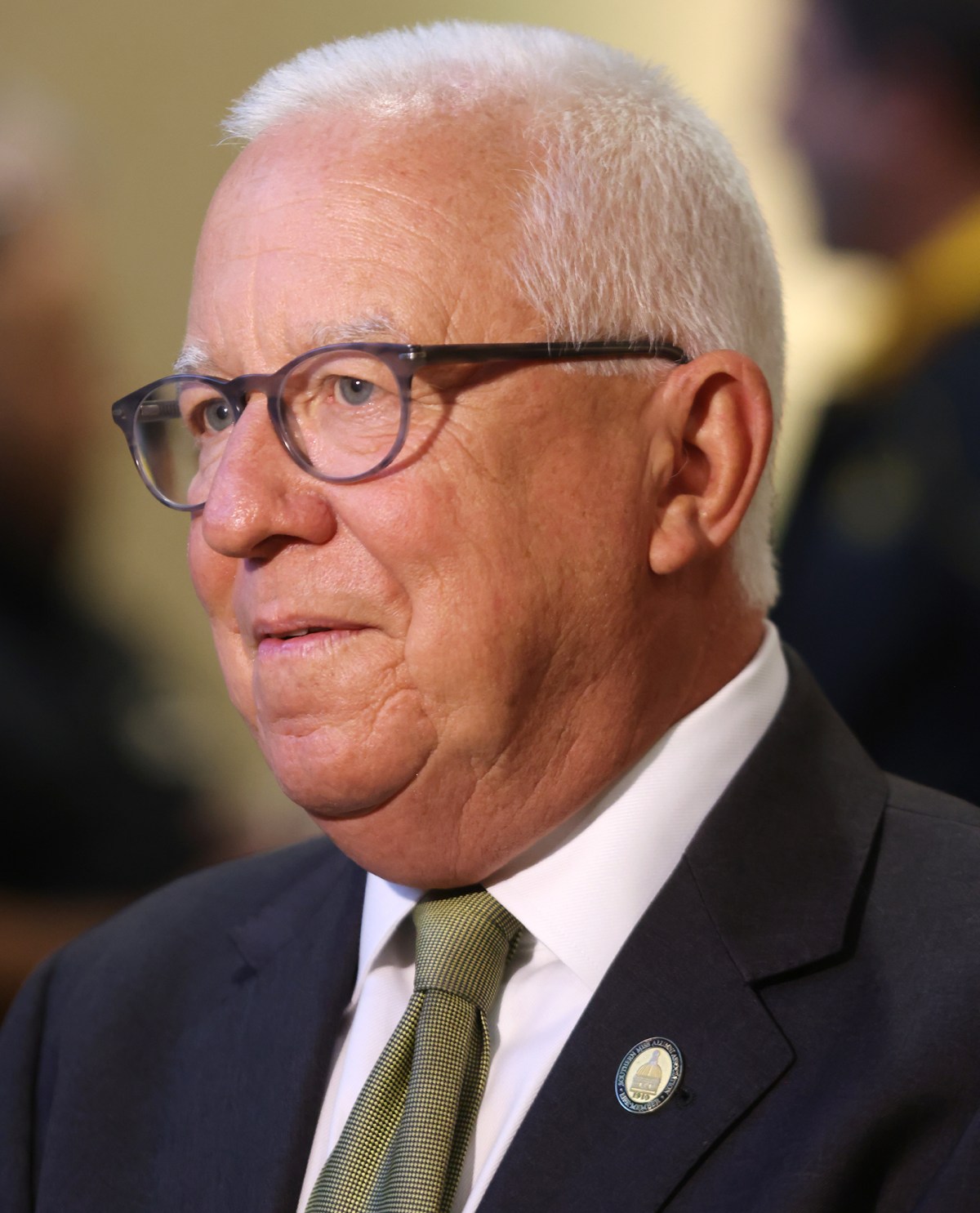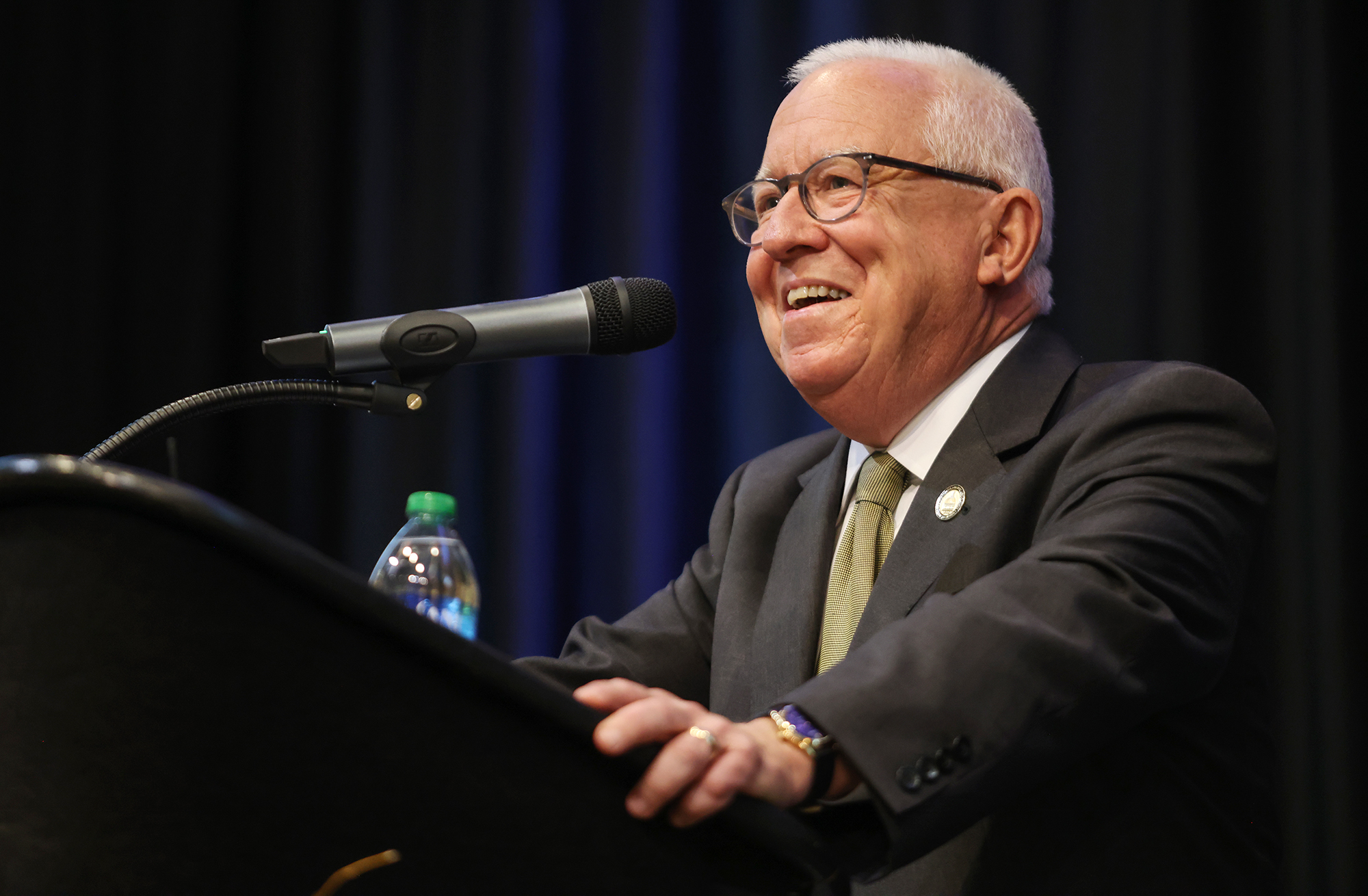Mississippi Today
New USM President Joe Paul discusses welfare scandal, diversifying students and faculty, and falling enrollment
New USM President Joe Paul discusses welfare scandal, diversifying students and faculty, and falling enrollment
New president of University of Southern Mississippi Joe Paul sat down for a 45-minute interview with Mississippi Today on Tuesday.
Paul, who is serving a four-year term with an annual salary of $650,000, discussed his priorities — including enrollment, especially at USM Gulf Park; maintaining the university’s top-tier research status; and fundraising, along with the need to increase the number of diverse students and faculty. He also read a prepared statement about the university’s role in the welfare scandal.
Paul was joined by Jim Coll, the university’s chief communications officer.
This interview has been edited for clarity and length.
Molly Minta: Can you talk about the university’s overall and current financial picture, particularly in the context of declining state appropriations in the last few decades?

Joe Paul: And more recently, a slight downturn in enrollment. The good news is that the University of Southern Mississippi is in excellent fiscal health. … We have about $150 million in unrestricted reserves. …If a disaster struck, and there were no external funding, we can operate for 155 days, which is well beyond the standard. (Editor’s note: IHL’s recommended minimum is 90 days cash on hand.)
The final thing deals with what we call our debt-ratio coverage. We’ve got about $13 million dollars in annual debt that comes with bonds for construction. Our coverage rate is just below 2.0 and that basically means we have twice as much as we need to assure that we can pay our debts.
Minta: You brought up the slight downturn in enrollment. (Editor’s note: Enrollment declined by 4.4% this fall to 13,526 students, according to IHL). How does that affect the overall financial picture?
Paul: I began in higher education over 40 years ago, and at that time, state appropriations probably covered 70-to-80% of the (budget). . Today that’s almost flipped, so enrollment becomes critical.
Minta: Does it seem like it’s possible to advocate (for) increased funding for higher education from the Legislature? Or is it just a picture of turning to other sources of funding?
Paul: Not to be ambiguous, but I think the answer is both. … We’ve got to continue to advocate for adequate funding to create top-level academic opportunities for Mississippi residents. At the same time, we’ve got to be really creative in terms of budget management. You cannot tuition your way out of a drop in state appropriations or a drop in enrollment. …The way I view student recruitment and enrollment growth is … it’s strategy, it’s processes … how customer friendly you can be is critical. … (It’s also) investment. What are you going to invest in marketing? What are you going to invest in scholarships? What are you going to invest in personnel to do recruitment? The final part is effort.
We were encouraged that in spite of the demographic shift toward fewer high school graduates — and more high school graduates going into vocational and technical programs, which is not a bad thing for the state of Mississippi — that we did have a slight uptick in freshmen this fall. I’m also encouraged — because we really focused on the community colleges this fall — that we’ve got 300 more new transfer students enrolled for spring semester. That’s a double-digit percentage bump for us.
Minta: What I would want to touch on a little more is if you could help people understand the drivers of the enrollment drop? … People seem to feel like there was an institutional failure that had contributed to the enrollment decline. (Is) there an element here where it’s unavoidable given the demographics that there’s going to be an enrollment drop?
Paul: … I don’t spend a lot of time in the rearview mirror in terms of what has happened — except as that might inform us going forward. Another core part of my leadership strategy is that I truly believe that two of the greatest wastes of human energy and leadership are blaming and justifying.
… For us, we’ve got to refocus on South Mississippi. … We’re located in the part of the state where there’s the most people and where there’s the most dynamic growth, right? … There’s no valid reason that students should drive through Hattiesburg to go to school anywhere else in Mississippi — that’s our mantra.
We’ve got to make sure that what we offer is distinctive from other options, whether they’re in state and certainly out of state. … If you want the bells and whistles (of a large university), in terms of the quality of the faculty, being able to engage in research as an undergraduate, state-of-the-art facilities, major college athletics, fraternities and sororities, you name it, and yet you want a bit more personal attention? Southern Miss is a great choice for you.
Minta: Tom Duff, the current IHL board president, (has) talked about what makes the satellite campus on the Gulf Coast, USM Gulf Park, really valuable. … Does increasing enrollment at Gulf Park factor into this overall strategy that you just laid out? What sort of conversations or plans have been started in terms of revitalizing that campus?
Paul: Molly, absolutely it does. It’s not only a mandate for me from the IHL board, but it is critical.
We’re the only dual-campus university in Mississippi, and (the) Mississippi Gulf Coast is a dynamic place. … When you talk about capacity and under-utilization (at Gulf Park), that is clearly a fact. … Let me be clear, my priorities are to grow enrollment overall, which means Hattiesburg, online and Gulf Park. … It’s not about that historical stuff about something we do at Gulf Park might hurt something in Hattiesburg. That is false logic. It’s not a part of what we’re about going forward.
So the overall strategy for growing Gulf Park comes down to this: Coastal academic programs for coastal people for coastal jobs. … What I want to do is focus programs on the Gulf Park campus that will lead to excellent job opportunities on the Mississippi Gulf Coast. … You’re going to have people — we already do in hydrographic science — that would come there from all over the world.
The other thing that we must do is we’ve got to forge a stronger partnership with Mississippi Gulf Coast Community College. That community college is a juggernaut. …. And also for Pearl River Community College. I envision a time soon when Mississippi Gulf Coast Community College faculty can teach classes on our campus and where we, as needed, can go to the Harrison County campus and teach Southern Miss courses. …
Minta: … What is the university’s commitment to keep or increase general education on the coast?
Paul: Because our Gulf Park campus is a non-residential campus, we’ve got to measure what we offer in terms of academic programming by the market demand.
I guess the best short answer is … we’ve got to be really careful to make sure that we’re doing things that are scalable and have a return on investment so that we can grow the campus. If we expended all of our resources on general education programs with very low enrollment, we would not have the resources to expand these programs that are more relevant to the Gulf Coast.
Minta: Last month, the state of Mississippi added USM’s volleyball stadium to its attempt to recoup the misspent welfare funds. Does USM plan to repay all of the improperly allocated welfare funds that have been questioned in the forensic audit? That would include not just the volleyball stadium but things like the $840,000 that was given to a ‘Student Development Program’ that was used to buy speciality performance drinks, popsockets and massages for student athletes?
Paul: Yeah. Molly, as you are well aware, from a legal standpoint it is an incredibly complex situation, right? And because the Southern Miss Athletic Foundation has now been named a party to the suit from DHS, I cannot comment because of pending litigation.
But I do want to say this: I’m deeply troubled by this. All of us are here. And anything that distracts us from our mission to serve the state of Mississippi concerns us gravely. And I’m committed to resolving this situation within legal limits as we move forward toward our goals and will remain relentless in our desire to reach an equitable resolution for all.
Minta: A lot of people were also unsatisfied with the statement on the welfare scandal. Many faculty and alumni … want the university to fully account for its role in the scandal; something like that would include a detailed timeline and who was involved. Is that something USM plans to do?
Paul: … We have complied with every request for information. All of that information is out there and accessible to our faculty and staff. And I understand and appreciate the point of view and have had a lot of conversations with faculty, collectively and individually, about it.
Minta: In terms of complying with every request for information, is that from the state of Mississippi, from reporters, from faculty?
Paul: Yes. (Editor’s note: USM officials have not responded to multiple questions from Mississippi Today about its November statement or the welfare funds it spent on perks for student athletes.)
Minta: Conservative lawmakers in Southern states are increasingly taking aim at tenure by linking the job protection to attacks against critical race theory. In Mississippi, past attempts in the Legislature to ban tenure have died in committee, but faculty want to know how you would respond to an effort from the state Legislature to ban tenure.
Paul: I believe absolutely that both academic freedom and the system of tenure are a cornerstone of what makes public higher education in the United States unique in all the world.
Our professors spend a great amount of their lives preparing themselves to become a PhD and a distinguished scholar and they have to have the unfettered ability to teach as they choose. And as president of Southern Miss, I will always defend that.
Minta: There has been a decline in the number of tenure-track faculty at USM from 2017 to 2021. There’s another view of attack on tenure as simply universities not filling those jobs or filling those jobs with adjunct professors. Faculty would like to know, would the university commit to increasing tenure-track positions?
Paul: I’m not privy to those numbers yet, Molly, and I don’t know if we have them–
Minta: They’re on IHL’s website.
Paul: This is a little bit speculative, because I wasn’t here, right, but it could be that a lot of that shift has to do with temporary budget constraints.
There are few things more important to this university than maintaining and enhancing our Carnegie (R1) designation. And, of course, our SACS accreditation. We cannot maintain and enhance that by creating a pattern of reducing tenure-track positions. … There is no movement afoot here to shift away from tenure-track and toward non-tenured instructors. This is a major research university, and we attract tenure-track professors who are great teachers and incredible scholars.
Can I talk more about the (R1 designation)? It’s prestigious. … But the prestige alone is not the value. … First, we’re a public university paid for by the taxpayers of Mississippi and (R1) designation allows us to create research, discovery, innovation that can lead to enhancing the quality of life and economic development in Mississippi. (R1) designation also allows us to recruit the best and brightest faculty from all over – not just the nation, but the world.
It’s critical that we maintain that (status) and that not only informs that question you had about tenure, but a lot of other questions you may have, such as compensation for graduate students. We’re in the first year of a three-year plan to enhance our graduate assistant stipends. (Editor’s note: The plan would increase stipends to $11,700 by fall 2024).
Minta: Another question about faculty that gets into a broader question about the university. Faculty are overwhelmingly white at USM.
Paul: Yes.
Minta: In 2021, there were just 52 Black faculty and 17 Hispanic faculty compared to 688 White faculty. Those are numbers from IHL.
Black students also make up 27% USM’s student body which is a higher percentage than its peer universities in Mississippi. It’s a higher rate among the predominantly white institutions in the state, but if you look at the overall demographics of … Mississippi, it’s still not equitable. Why aren’t Black students attending USM? Why aren’t Black faculty coming to teach at USM? What can the university better do to serve this community?
Paul: … I need to point out that in many ways, our student body is the most reflective in Mississippi, among research universities, of the population in our state, in terms of African American Mississippians, in terms of other kinds of areas … the ratio of in-state to out-of-state students would be another example.
That’s not to say that we’re good there, Molly, okay? Because my core belief is that as a state institution, we should reflect the population that we serve.
You sort of phrased the question like, what’s the problem? To me, it’s not, ‘what’s the problem?’ It’s, ‘what’s the opportunity?’ … I think the far more challenging, perplexing problem is how do we create a faculty that reflects the demographics of our current student body? That’s not a challenge unique to Southern Miss. … Currently, we are in a search for a new permanent provost and … the first conversation that I want to have with that person is around diversity, equity and inclusion. Specifically, how can we recruit and retain more non-white faculty members at Southern Miss? … We don’t have answers for you today.
… I think traditionally what we’ve done in faculty recruitment is wait till they’re out there and let them come to you. When it comes to diversifying the faculty, my idea would be, why don’t we start to build relationships with a diverse pool of students while they’re pursuing their doctoral degrees at outstanding institutions? Another side of the equation is, what are we doing for diverse faculty members when they get here? How are we making sure that they are welcome?
Minta: Have you looked more at (how to diversify) the student body or more at specific strategies or types of outreach the university should be doing?
Paul: We have an incredibly strong program currently in terms of student life around diversity, equity, and inclusion. … Though the number of high school graduates is (going to be) decreasing in Mississippi, the diversity of those graduates is increasing. They’re more non-white each year, so the opportunity is there. We’re going to be more diverse.
Minta: Is it a matter of making the campus more welcoming or providing more scholarships or financial aid for non-white or Black students specifically?
Pau: It’s all of that. It’s making sure that you’ve got a diverse staff and student life. … Growing the diversity of faculty is a key to it. And it’s making sure (there is) diversity in terms of recruitment staff. Molly, it has to be more than words, you know?
Minta: The average faculty salary at USM during the 2020-21 school year was little over $70,000 and that is significantly less than the SREB average. The average staff member makes a little more than $47,000. How do you plan to meaningfully increase faculty and staff pay, keeping in mind that the percentage-base pay increases that are granted by the Legislature don’t keep pace with inflation or the increase in the cost of health insurance?
Paul: I think we’re about 80% of the SREB average in Mississippi in general.
I am strongly committed to increasing pay for faculty and staff, from professional staff to those hard-working folks that keep this place going every day. I don’t disagree that largely what the Legislature has been able to do — I’m grateful for it and extremely hopeful again this year — is that as they appropriate for increases, at least in our short-run economy, that inflation is outpacing that.
… There is no magic-wand solution to that. One of the things that can enable us to do that is … to create revenue through the increasing number of students that we can then commit to moving faculty salaries toward the SREB average.
Minta: Is there anything I haven’t asked about that you’d like to talk about?
Jim Coll, addressing Paul: Priority-wise, we’ve talked about a couple things, but you haven’t talked about private fundraising.
Paul: Yeah, I mean, I don’t know who I’ve got out there. So, there are a couple things I want to tell you.
I think the role of the president as a leader in higher education is critical. … I want to establish … a sense of being present and accessible to our students, our faculty, our staff, alumni and other constituents. The other side of it is that I absolutely believe that … you’ve got to earn the trust of those that you’ve been given the responsibility to lead. Trust is not given … it has to be earned every day by the relationship between what you say and what you commit to and what you do.
The other (piece) of the main agenda from me … is private philanthropy. One of my goals is to push us well beyond the $150 million goal that we have in our Capital Campaign. We rest at about $132 million now. Since I’ve been here in July, we’ve raised about $8 million. I want to push it well beyond that.
Minta: There was another question I wanted to ask. Last year, the student newspaper ran an article on how international students would like more support, particularly when it comes to finding housing and securing internships and scholarships. Have you been doing anything to address these concerns and if so, what?
Paul: I’m aware of that. I’ve got a working to-do list but, Molly, I’ve not been able to corral the folks yet to have that conversation. I think it’s critically important.
The number of international students ebbs and flows and right now. … But every student that comes to Southern Miss deserves … the full Southern Miss experience, not to be marginalized. And that certainly includes our international students.
This article first appeared on Mississippi Today and is republished here under a Creative Commons license.
Did you miss our previous article…
https://www.biloxinewsevents.com/?p=203911
Mississippi Today
Hospitals see danger in Medicaid spending cuts
Mississippi hospitals could lose up to $1 billion over the next decade under the sweeping, multitrillion-dollar tax and policy bill President Donald Trump signed into law last week, according to leaders at the Mississippi Hospital Association.
The leaders say the cuts could force some already-struggling rural hospitals to reduce services or close their doors.
The law includes the largest reduction in federal health and social safety net programs in history. It passed 218-214, with all Democrats voting against the measure and all but five Republicans voting for it.
In the short term, these cuts will make health care less accessible to poor Mississippians by making the eligibility requirements for Medicaid insurance stiffer, likely increasing people’s medical debt.
In the long run, the cuts could lead to worsening chronic health conditions such as diabetes and obesity for which Mississippi already leads the nation, and making private insurance more expensive for many people, experts say.
“We’ve got about a billion dollars that are potentially hanging in the balance over the next 10 years,” Mississippi Hospital Association President Richard Roberson said Wednesday during a panel discussion at his organization’s headquarters.
“If folks were being honest, the entire system depends on those rural hospitals,” he said.
Mississippi’s uninsured population could increase by 160,000 people as a combined result of the new law and the expiration of Biden-era enhanced subsidies that made marketplace insurance affordable – and which Trump is not expected to renew – according to KFF, a health policy research group.
That could make things even worse for those who are left on the marketplace plans.
“Younger, healthier people are going to leave the risk pool, and that’s going to mean it’s more expensive to insure the patients that remain,” said Lucy Dagneau, senior director of state and local campaigns at the American Cancer Society.
Among the biggest changes facing Medicaid-eligible patients are stiffer eligibility requirements, including proof of work. The new law requires able-bodied adults ages 19 to 64 to work, do community service or attend an educational program at least 80 hours a month to qualify for, or keep, Medicaid coverage and federal food aid.
Opponents say qualified recipients could be stripped of benefits if they lose a job or fail to complete paperwork attesting to their time commitment.
Georgia became the case study for work requirements with a program called Pathways to Coverage, which was touted as a conservative alternative to Medicaid expansion.
Ironically, the 54-year-old mechanic chosen by Georgia Gov. Brian Kemp to be the face of the program got so fed up with the work requirements he went from praising the program on television to saying “I’m done with it” after his benefits were allegedly cancelled twice due to red tape.
Roberson sent several letters to Mississippi’s congressional members in weeks leading up to the final vote on the sweeping federal legislation, sounding the alarm on what it would mean for hospitals and patients.
Among Roberson’s chief concerns is a change in the mechanism called state directed payments, which allows states to beef up Medicaid reimbursement rates – typically the lowest among insurance payors. The new law will reduce those enhanced rates to nearly as low as the Medicare rate, costing the state at least $500 million and putting rural hospitals in a bind, Roberson told Mississippi Today.
That change will happen over 10 years starting in 2028. That, in conjunction with the new law’s one-time payment program called the Rural Health Care Fund, means if the next few years look normal, it doesn’t mean Mississippi is safe, stakeholders warn.
“We’re going to have a sort of deceiving situation in Mississippi where we look a little flush with cash with the rural fund and the state directed payments in 2027 and 2028, and then all of a sudden our state directed payments start going down and that fund ends and then we’re going to start dipping,” said Leah Rupp Smith, vice president for policy and advocacy at the Mississippi Hospital Association.

Even with that buffer time, immediate changes are on the horizon for health care in Mississippi because of fear and uncertainty around ever-changing rules.
“Hospitals can’t budget when we have these one-off programs that start and stop and the rules change – and there’s a cost to administering a program like this,” Smith said.
Since hospitals are major employers – and they also provide a sense of safety for incoming businesses – their closure, especially in rural areas, affects not just patients but local economies and communities.
U.S. Rep. Bennie Thompson is the only Democrat in Mississippi’s congressional delegation. He voted against the bill, while the state’s two Republican senators and three Republican House members voted for it. Thompson said in a statement that the new law does not bode well for the Delta, one of the poorest regions in the U.S.
“For my district, this means closed hospitals, nursing homes, families struggling to afford groceries, and educational opportunities deferred,” Thompson said. “Republicans’ priorities are very simple: tax cuts for (the) wealthy and nothing for the people who make this country work.”
While still colloquially referred to as the One Big Beautiful Bill Act, the name was changed by Democrats invoking a maneuver that has been used by lawmakers in both chambers to oppose a bill on principle.
“Democrats are forcing Republicans to delete their farcical bill name,” Senate Democratic Leader Charles Schumer of New York said in a statement. “Nothing about this bill is beautiful — it’s a betrayal to American families and it’s undeserving of such a stupid name.”
The law is expected to add at least $3.3 trillion to the nation’s debt over the next 10 years, according to the most recent estimate from the Congressional Budget Office.
This article first appeared on Mississippi Today and is republished here under a Creative Commons Attribution-NoDerivatives 4.0 International License.
The post Hospitals see danger in Medicaid spending cuts appeared first on mississippitoday.org
Note: The following A.I. based commentary is not part of the original article, reproduced above, but is offered in the hopes that it will promote greater media literacy and critical thinking, by making any potential bias more visible to the reader –Staff Editor.
Political Bias Rating: Center-Left
This article reports on the negative impacts of a major federal tax and policy bill on Medicaid funding and rural hospitals in Mississippi. While it presents factual details and statements from stakeholders, the tone and framing emphasize the harmful consequences for vulnerable populations and health care access, aligning with concerns typically raised by center-left perspectives. The article highlights opposition by Democrats and critiques the bill’s priorities, particularly its effect on poor and rural communities, suggesting sympathy toward social safety net preservation. However, it maintains mostly factual reporting without overt partisan language, resulting in a moderate center-left bias.
Crooked Letter Sports Podcast
Podcast: The Mississippi Sports Hall of Fame Class of ’25
The MSHOF will induct eight new members on Aug 2. Rick Cleveland has covered them all and he and son Tyler talk about what makes them all special.
Stream all episodes here.
This article first appeared on Mississippi Today and is republished here under a Creative Commons Attribution-NoDerivatives 4.0 International License.
The post Podcast: The Mississippi Sports Hall of Fame Class of '25 appeared first on mississippitoday.org
Mississippi Today
‘You’re not going to be able to do that anymore’: Jackson police chief visits food kitchen to discuss new public sleeping, panhandling laws
Diners turned watchful eyes to the stage as Jackson Police Chief Joseph Wade took to the podium. He visited Stewpot Community Services during its daily free lunch hour Thursday to discuss new state laws, which took effect two days earlier, targeting Mississippians experiencing homelessness.
“I understand that you are going through some hard times right now. That’s why I’m here,” Wade said to the crowd. “I felt it was important to come out here and speak with you directly.”
Wade laid out the three bills that passed earlier this year: House Bill 1197, the “Safe Solicitation Act,” HB 1200, the “Real Property Owners Protection Act” and HB 1203, a bill that prohibits camping on public property.
“Sleeping and laying in public places, you’re not going to be able to do that anymore,” he said. “There’s a law that has been passed that you can’t just set up encampments on public or private properties where it’s a public nuisance, it’s a problem.”
The “Real Property Owners Protection Act,” authored by Rep. Brent Powell, R-Brandon, is a bill that expedites the process of removing squatters. The “Safe Solicitation Act,” authored by Rep. Shanda Yates, I-Jackson, requires a permit for panhandling and allows people to be charged with a misdemeanor if they violate this law. The offense is punishable by a fine not to exceed $300 and an offender could face up to six months in jail. Wade said he’s currently working with his legal department to determine the best strategy for creating and issuing permits.
“We’re going to navigate these legal challenges, get some interpretations, not only from our legal department, but the Attorney General’s office to ensure that we are doing it legally and lawfully, because I understand that these are citizens,” he said. “I understand that they deserve to be treated with respect, and I understand that we are going to do this without violating their constitutional rights.”
Wade said the Jackson Police Department is steadily fielding reports of squatters in abandoned properties and the law change gives officers new power to remove them more quickly. The added challenge? Figuring out what to do with a person’s belongings.
“These people are carrying around what they own, but we are not a repository for all of their stuff,” he said. “So, when we make that arrest, we’ve got to have a strategic plan as to what we do with their stuff.”
Wade said there needs to be a deeper conversation around the issues that lead someone to becoming homeless.
“A lot of people that we’re running across that are homeless are also suffering from medical conditions, mental health issues, and they’re also suffering from drug addiction and substance abuse. We’ve got to have a strategic approach, but we also can’t log jam our jail down in Raymond,” Wade said.
He estimates that more than 800 people are currently incarcerated at the Raymond Detention Center, and any increase could strain the system as the laws continue to be enforced.
“I think there’s layers that we have to work through, there’s hurdles that we are going to overcome, but we’ve got to make sure that we do it and make sure that my team and JPD is consistent in how we enforce these laws,” Wade said.
Diners applauded Wade after he spoke, in between bites of fried chicken, salad, corn and 4th of July-themed packaged cakes. Wade offered to answer questions, but no one asked any.
Rev. Jill Buckley, executive director of Stewpot, said that the legislation is a good tool to address issues around homelessness and community needs. She doesn’t want to see people who are homeless be criminalized, but she also wants communities to be safe.
“I support people’s right to self determine, and we can’t impose our choices on other people, but there are some cases in which that impinges on community safety, and so to the extent that anyone who is camping or panhandling or squatting and is a danger to themselves and others, of course, I fully support that kind of law. I don’t support homelessness being criminalized as such,” Buckley said.

Many of the people Wade addressed while they ate Thursday said they have housing, don’t panhandle, and shouldn’t be directly impacted by the legislation. But Marcus Willis, 42, said it would make more sense if elected officials wanted to combat the negative impacts of homelessness that they help more people secure employment.
“There ain’t enough jobs,” said Willis, who was having lunch with his girlfriend Amber Ivy.
The two live in an apartment together nearby on Capitol Street, where Ivy landed after her mother, whom Ivy had been living with, suffered a stroke and lost the property. Similarly, Willis started coming to eat at Stewpot after his grandmother, whose house he used to visit for lunch, passed away.
Willis holds odd jobs – cutting grass, home and auto repair – so the income is inconsistent, and every opportunity for stable employment he said he’s found is outside of Jackson in the suburbs. The couple doesn’t have a car.
Making rent every month usually depends on their ability to find someone to help chip in, said Ivy, who is in recovery from substance abuse. She said she’s watched problems surrounding homelessness grow over the years in Jackson. Ivy grew up near Stewpot and has lived in various neighborhoods across the city – except for the times she moved out of state when things got too rough.
“There was just moments where I just had to leave,” Ivy said. “Sometimes if you hit a slump here, there’s almost no way for you to get out of it.”
This article first appeared on Mississippi Today and is republished here under a Creative Commons Attribution-NoDerivatives 4.0 International License.
The post 'You're not going to be able to do that anymore': Jackson police chief visits food kitchen to discuss new public sleeping, panhandling laws appeared first on mississippitoday.org
Note: The following A.I. based commentary is not part of the original article, reproduced above, but is offered in the hopes that it will promote greater media literacy and critical thinking, by making any potential bias more visible to the reader –Staff Editor.
Political Bias Rating: Center-Right
This article primarily reports on new laws in Jackson, Mississippi, targeting public sleeping, panhandling, and squatting, focusing on statements by Police Chief Joseph Wade and community perspectives. The coverage presents the legislative measures—authored by Republican and independent lawmakers—with a tone that emphasizes law enforcement challenges and community safety, reflecting a conservative approach to homelessness as a public order issue. While it includes voices concerned about criminalization and the need for social support, the overall framing centers on law enforcement and property protection. The article maintains factual reporting without overt editorializing but leans slightly toward a center-right perspective by highlighting legal enforcement as a solution.
-
News from the South - Arkansas News Feed6 days ago
Real-life Uncle Sam's descendants live in Arkansas
-
News from the South - Louisiana News Feed7 days ago
Her son faced 10 years behind bars; now she’s the one facing prison
-
News from the South - Arkansas News Feed7 days ago
Could roundabouts become more common than red lights?
-
News from the South - Georgia News Feed5 days ago
'Big Beautiful Bill' already felt at Georgia state parks | FOX 5 News
-
News from the South - Oklahoma News Feed6 days ago
LOFT report uncovers what led to multi-million dollar budget shortfall
-
News from the South - Alabama News Feed7 days ago
Alabama schools to lose $68 million in federal grants under Trump freeze
-
News from the South - Missouri News Feed7 days ago
Celebrate St. Louis returns with new Superman-themed drone show
-
News from the South - South Carolina News Feed6 days ago
South Carolina lawmakers react as House approves Trump’s sweeping economic package





















































